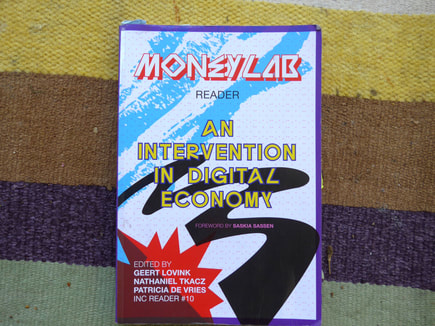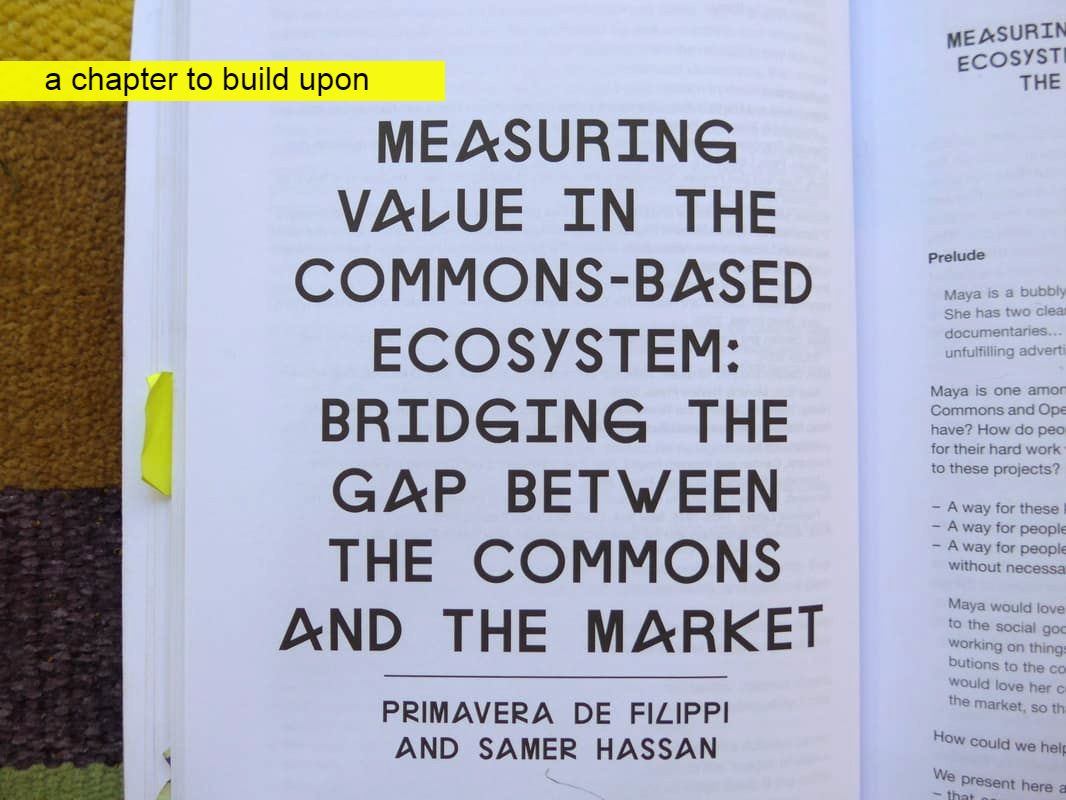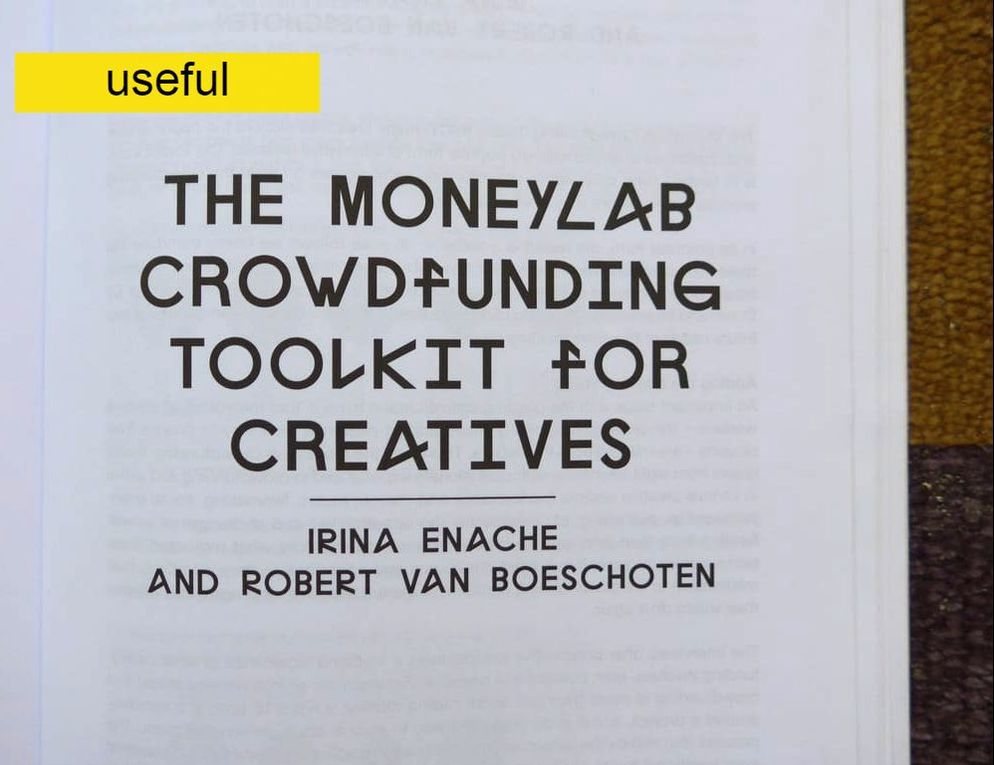BOOK REVIEW: "AN INTERVENTION ON DIGITAL ECONOMY" / measuring the value of the knowledge commons12/1/2015 The Institute for Network Cultures released this book on Digital economy, edited by Geert Lovink, Nathaniel Tkacz and Patricia de Vries. This compilation of essays from artists and practitioners introduces conceptual frameworks that expand the notion of money as a medium of exchange and manipulation, towards new understandings of the economy given the posibilities for trading on the internet. The book spans around philosophical examinations of Capitalism and the urgent need for creating and accessing more imaginative and collaborative modes of production and consumption, depicting some examples from art and design, as well as essays with the tone of manifestos for the complete re-structuring of our economic models. What is interesting about this book is the nature of the contributions. The essays are written by artists, designers and creative practitioners that not only propose a new perspective to look at our socio-economic dynamics, but make their voice visible through interventions and public discussions. This book is particularly interesting for people who want to understand how the network economy is transforming the very premises of the capitalist model: rivalry, competition and accumulation are not the goal for alternative economic systems. Pretty much all the book advocates for collaborative financial models in digital environments, rescuing what economics as a discipline couldn't explain for many years: the fact that humans are irrational and very likely to express cooperative behaviours with others, if they are located in the right environment and facing the incentives that favour cooperation. On this chapter (title in the above picture), the authors use the case of Maya, a young girl who writes for Wikipedia and Creative Commons, but is unsure of the value of her contributions and her family doesn't understand why is she spending too much time working on things that offer no money in return. The questions posed by the authors (that Maya may be imagining) are:
Sabir is a quantifier indicator (or value metric algorithm) of the social value of commons-based entities which helps to identify the value generated by individuals to the commons and evaluate it through a common denominator. The system is a web-of-trust of commons-based entities that regulate the entrance of a non-commons entity (e.g. Skype), which means that the network filters and discriminates players. Each entity gets vouchers to distribute amongst the people that contribute to them. Vouchers are translated into a common denominator of value and a once a person acquires them, the vouchers can be stored in a personal wallet. The usefulness is to exchange vouchers for rewards "in the physical world", for example, a Cheese burger from Mc Donald's or a free license for Adobe Photoshop. The authors argue that this system will encourage people to contribute to the commons because of the deals they can get by certain companies, and as opposed to conventional currencies, which can be transferred to one individual to another, Sabir indicator would be associated with the same individual during her whole lifetime. The chapter is complemented with formulas and algorithms. Though the intentions of the proposal tackle a very tricky aspect of the commons (its valuation and the equivalent of the value of the commons in the market economy), there are some philosophical considerations about the notion of information and knowledge as a commons that are pretty weak. I believe that the contributions of Maya to Wikipedia (if they are indeed good) do get remunerated in powerful ways: getting comments on her publications, fostering more offline conversations with her ideas, having more visitors to her websites or generating debates or even "likes" in social media. Just because they are immaterial rewards does not mean they are not relevant. (Part of a digital literacy program is to recognize forms of altruism). Maya is a young girl, who by contributing, is showing certain level of confidence of her intelligence and even her gender identity, because is not easy for women to express an opinion (offline or online). Therefore, the more debates her contributions spark, the more empowerment is being created in others, the more are we witnessing the potential of the internet, and there is no particular need to measure such empowerment with a metric, where it is about people feeling accepted in a community and open to speak up. The Sabir system is interesting in the sense that proposes rewarding as an incentive to keep people contributing to the commons, but at the same time prefers quantity over quality. Given the current corporate and government manipulations of content on the internet, as well as the many threats to human rights on the net, expressing an opinion now means the erosion of the public commons, as being connected means our loss of privacy. Not all the content created by a person is benefiting the community. Simple examples include vandalism on Wikipedia or trolls in tweeter. On the other hand, the Sabir project proposes that vouchers (value) should be owned by one person exclusively. This is problematic, since the internet is a big depository of Knowledge commons, which are non-propietary in nature. The concept of ´Commons´ challenges the concentration of power by few, and favour the distribution of access and opportunity. If the rewards are owned by individuals, the system will end up contributing to the individualization of benefits and therefore incentivizing rivalry by other contributors. What we would need on this respect is to make the system a community-owned infrastructure for collective ownership. Continuing with the idea of rewards, the Sabir project encourages Mc Donald's burgers or Adobe licenses as exchange of value. This is a sign that the system has been thought as transactional in nature, leaving aside responsibilities at the community level. Supporting open source software on one hand, and environmental and working exploitation by McDonalds is not a congruent cause. The example of Adobe is also incongruent. Creative practitioners cannot rely anymore in closed-source paid software as Adobe suit is. It is tremendously unsustainable and it narrows our imagination of what is graphically possible. If the incentive for people to write in Wikipedia is to eat in Mc Donald's, then it looks for me that the burger is not encouraging more Wikipedia articles, but perpetuating the manipulation of corporations of all the possible bridges between our offline-online lives. Thinking on a system for valuing contributions to the commons is an ongoing question. The Sabir project is making a very interesting step towards elucidating an answer and more debate is needed. Indeed, it is necessary to expand the approaches for valuing Wikipedia, not necessarily as the value of the time put in by all its volunteers. Traditional value measurements would value the platform through its advertising, but Wikipedia does not have any. Is Wikipedia’s value the displaced revenue at Encarta, Britannica, World Book and Colliers? Or is Wikipedia the value to users, and the time savings it affords? What concept of value is appropriate, how would we implement it, and how to measure its growth? The answers to who are we contributing to is rapidly changing, as open-source start-ups are constantly acquired by giant corporations. The value of the commons is not a measurement but an ecosystem, interweaved with larger market forces.
0 Comments
Your comment will be posted after it is approved.
Leave a Reply. |
|


